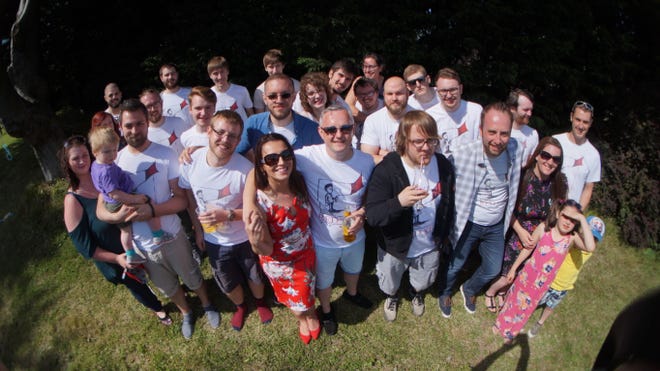Red Kite: Work-for-hire removes the risk from your own IP
CEO Simon Iwaniszak discusses the highs and lows of co-development as his studio unveils Hollowpoint
It's the dream of almost every work-for-hire studio in the industry: to eventually break away from the constraints of other people's IP and work on your very own.
The dream has come true for UK studio Red Kite Games, which has today unveiled Hollowpoint: a co-op action title that challenges players with surviving a series of procedurally generated dystopian battlefields.
While development began at Paradox Interactive, rights to the IP have passed over to Red Kite, marking the studio's first-ever owned IP.
"A successful first IP could be huge, but an unsuccessful one won't sink the ship. Red Kite is balanced so no one project holds that kind of power"
The path to Hollowpoint has been littered with numerous high-profile projects. Over the past five years, the studio has worked with 17 companies such as Activision, Sony, Microsoft, Codemasters and Sumo Digital on a wide range of projects, from AAA racer Dirt 4 to indie hit Unbox - and that's just from the projects the team is allowed to publicly declare on its website.
For CEO Simon Iwaniszak, the journey has been a rewarding one and more than prepared Red Kite for the challenge of handling its own IP.
"Work-for-hire is something that we've been doing at Red Kite from day one," he tells GamesIndustry.biz. "It has enabled the talent that we have at the studio to work on some amazing games with some very cool people across the industry.

"Working on our own IP has always been on the radar. It's something that I now feel the studio is perfectly placed to take on. The experience that the team now has through the completion of work-for-hire projects has developed Red Kite into a flexible and robust outfit.
"At present we're going from strength to strength with no intentions of slowing down. It's not a case of having planned to work on our own IP specifically at this point, but rather a case of waiting for the right opportunity, the right idea."
Crucially, Iwaniszak says this does not mean an end to Red Kite's work-for-hire duties. The studio has just finished two projects, has one ongoing and a fourth that has only just started, with the CEO adding there are "plenty more irons on the fire."
But why, having finally reached the stage where the studio no longer needs to rely on other companies' projects would it continue to seek them out?
"With Red Kite, a successful first IP could be huge, but an unsuccessful one won't sink the ship either," Iwaniszak explains. "The studio is balanced so no one project holds that kind of power.
"Developing your own IP is also a great way to showcase your work-for-hire skills as you don't have to explain to a potential future partner what your team did on a particular project - you did it all."

Work-for-hire can be tough but Iwaniszak believes it's one of the best ways for a new or smaller studio to equip itself to eventually develop new franchises. For one thing, it can attract established talent that still want to work on high-profile titles (albeit often in stealth) rather than risky indie ventures.
Many of the Red Kite team, he observes, have worked on "some of the biggest games of the past two decades" and even Iwaniszak himself is ex-Rockstar, having contributed to the likes of Red Dead Redemption, GTA Chinatown Wars and LA Noire.
If other studios hope to acquire such talent, and the best clients, he advises that they prepare themselves for every possible development project.
"Sign up as registered developers for all the major platform holders, even if you don't have plans to work with them at the time," he suggests. "A potential partner may need to move quickly in securing additional resource for a project and if you're not already a registered developer for the platform in question, any delay could scupper a deal.
"You can't just jump straight into creating your own IP. You need to build your studio up and earn it, to be honest"
"My biggest tip would be - become invaluable. It sounds obvious, but if you do a half-hearted job when it comes to work-for-hire, you won't last long. Even though it's not your project, you have to treat it as though it is. Triggering repeat business is smart business.
"Word travels fast in this industry and making a name for yourself in the work-for-hire world is about building long-term relationships with partners who can trust you implicitly to deliver."
It's also important to choose your partners carefully, and remember you have more say in who you work with than you might think. Obviously, holding out for only the biggest and best contracts may prove problematic when it comes to paying the bills - especially if you're only just starting out - but that doesn't mean you need to accept every offer.
"One mistake that I feel that work-for-hire studios often make is that they opt to work with everyone and anyone. When it comes to work-for hire, money isn't the only reason to do it," says Iwaniszak. "Is it with a high-profile partner? Is it a cool game or IP? What transferable knowledge will be gained? You should accept work-for-hire projects that will push your studio forward and not focus purely on what's going to pay the bills.
"This will also help to build your studio's identity whilst directing the type of games that you're likely to work on. I feel that Red Kite's work-for-hire identity is that we help platform holders, big publishers and big studios make big games."
But, he adds, it's also important to diversify who you work with: "You shouldn't rely on just one or two partners - working with different partners not only spreads the risk, but it also improves the skillset of your team and helps to build out your portfolio. Work-for-hire can quickly dry up and it's important to have options should this happen."
While every work-for-hire studio may yearn to develop their own IP - after all, it's likely the reason they are taking on such contracts: to fund their own dream projects - Iwaniszak urges patience and caution to his fellow co-developers.
"You can't just jump straight into creating your own IP - especially if you're also going to carry on doing work-for-hire at the same time. You need to build your studio up and earn it, to be honest."
